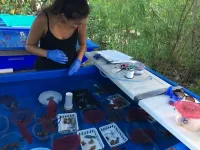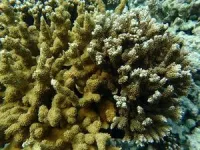(Press-News.org) Algae living within the soft tissue of coral supply much of the energy needed by their hosts, and some symbiotic algae help coral withstand warmer water better than others. In a recently published study led by the University of Hawai‘i at Mānoa, researchers found that there was a tradeoff for corals dominated by the thermally sensitive algae—they have higher growth, but only in cooler water.
“As the ocean continues to warm, understanding how symbionts and environmental factors affect coral growth and health will help predict reef futures and inform conservation interventions where coral stocks are selected for specific traits or symbionts,” said Shayle Matsuda, a doctoral student at the Hawai‘i Institute of Marine Biology in the UH Mānoa School of Ocean and Earth Science and Technology at the time of the research.
The study was co-led by Matsuda, now a postdoctoral fellow at the Shedd Aquarium, and Mariah Opalek, who conducted the experiment for her undergraduate thesis at UH Mānoa. The research team investigated whether rice corals hosting symbiotic algae that can tolerate warmer water may grow more slowly, which could impact survivorship and competition for space on the reef, compared to coral hosting symbionts that are more susceptible to bleaching when ocean waters warm.
Over a two-month study period, the researchers measured the growth of rice corals dominated by heat tolerant or heat sensitive symbiotic algae. Additionally, they tested growth across decreasing light levels to see if the tradeoff between growth and tolerance to warm water would be affected by light, which is a major driver of the distribution of these symbionts in Kāneʻohe Bay, Hawai‘i.
“This research shows us the complexity of coral growth on a reef,” said Opalek, who is now a grant support assistant at Kaua’i Community. “A coral’s competitive advantage could be lost in a matter of a few degrees depending on what type of symbiont they associate with.”
During the first month, when water temperatures were warmer, the symbiont present did not affect growth. However, over the cooler second month, corals with heat sensitive algae grew up to 77% faster than corals dominated by heat tolerant algae, and this growth advantage increased in higher light treatments, which correlates to shallower depths on a reef.
“This means that the growth advantage associated with the thermally sensitive corals may only occur during a handful of the cooler months,” said Matsuda. “As ocean warming continues, it is likely that the advantage of hosting thermally tolerant symbionts outweighs any growth advantage hosting the thermally sensitive species might.”
END
Heat tolerant coral may trade fast growth for resilience
2023-11-16
ELSE PRESS RELEASES FROM THIS DATE:
Genomic tug of war could boost cancer therapy
2023-11-16
Some patients with myelodysplastic syndromes, like acute myeloid leukemia, benefit from a chemotherapy drug called decitabine that stunts cancer growth. But many others are resistant to decatibine’s effects or become resistant over time. Wilmot Cancer Institute researchers have uncovered a “genomic tug of war” in animal studies that could influence how well certain patients—or certain cancers—respond to decitabine.
In a study published in the journal Development, ...
New research questions the nature and meaning of "psychic-channeling" experiences
2023-11-16
The question of disembodied consciousness or the afterlife has received much scientific scrutiny over the last several years. One line of research involves so-called "channelers" or mediums who claim to receive and communicate information that they believe comes from some other being or dimension of reality that differs from everyday reality. Now, an international team of scientists has critically examined these claims. New research published in the Journal of Scientific Exploration asked 15 pre-vetted channelers to access the same "nonphysical being or spirit" source and answer a structured set of 10 questions from the scientific team. The statistical ...
Drug manufacturers use FDA, patent strategies to keep insulin prices high
2023-11-16
Over the last four decades, insulin manufacturers have extended their periods of market exclusivity on brand-name insulin products by employing several strategies, including filing additional patents on their products after FDA approval and obtaining many patents on delivery devices for their insulin products. That is the conclusion of a new analysis of FDA and patent records carried out by William Feldman of Brigham and Women’s Hospital, USA, and colleagues, and published November 16th in the open access journal PLOS Medicine.
Insulin is the primary, life-saving treatment for type 1 and some type 2 diabetes but remains costly in the US even ...
Growing income inequities in the utilization of healthcare resources, Swedish study finds
2023-11-16
Swedish people with the lowest incomes utilize primary and outpatient care on par with those with the highest incomes despite having significantly higher mortality rates, according to a new study published November 16th in the open access journal PLOS Medicine by Pär Flodin of Karolinska Institutet, Sweden, and colleagues.
Socioeconomic differences in healthcare utilization have persisted in modern welfare states even with universal healthcare. In recent decades, Sweden has witnessed a rise in income inequalities, accompanied by shifts in the sociodemographic composition of the population ...
Love thy neighbor: Cooperation extends beyond one’s own group in wild bonobos
2023-11-16
A new study published this week in Science challenges the notion that only humans are capable of forming strong and strategic cooperative relationships and sharing resources across non-family groups. Researchers from Harvard University and the German Primate Center examined the pro-social behavior of bonobos (Pan paniscus), one of humanity’s closest living relatives, finding that their cooperation extends beyond one’s own group to societal cooperation with different groups.
Studying humans' two closest living relatives, chimpanzees and bonobos, can help reconstruct ancestral human traits like cooperation and conflict. Despite living in similar ...
New molecular glue degraders could help target troublesome proteins
2023-11-16
Cells contain molecular machinery that targets and disposes of unwanted proteins to maintain homeostasis. Scientists think that with the help of “matchmaker” molecules called molecular glue degraders, this machinery could be hijacked to control proteins involved in diseases like cancer. But only a few of these glue degraders have been discovered so far—and mostly by chance.
Zuzanna Kozicka, as a Ph.D. student at Friedrich Miescher Institute in Basel, Switzerland, embarked on a deliberate search for these glues with her team and identified a novel class of molecular glue degraders with more than 40 chemically diverse members. Kozicka, who is now a postdoctoral ...
High efficiency and cooling performance in an electrocaloric heat pump
2023-11-16
Researchers have developed a solid-state electrocaloric cooling device that can generate a 20 kelvin temperature difference with high efficiency, according to a new study. The findings show that electrocaloric cooling can compete with other solid-state cooling strategies and offer a promising alternative to environmentally unfriendly vapor compression cooling. Cooling devices, including air-conditioning and heat pump systems, are estimated to consume roughly 20% of global electricity. Most of these systems operate through vapor-compression technologies, which are relatively inefficient and require environmentally harmful fluorinated refrigerants. Cooling through solid-state electrocaloric ...
The secret behind mussels’ quick-release interface
2023-11-16
The same bundle of non-living filaments that mussels use to anchor themselves within their environment – to withstand crushing waves, for example – can also be jettisoned on demand. Mussels create this quick-release interface, a new study finds, by way of a neurochemically-mediated junction, where billions of motile cilia hold fast to interlinked biopolymer sheets. "[The study’s] findings could be informative about how nonliving materials can be dynamically interfaced with living tissue, as in the case of detachable biosensors and medical implants," write Guoqing Pan and Bin Li in a related ...
Presenting a new GRAB sensor toolkit for neuropeptides
2023-11-16
New biosensors have helped reveal the activity of neuropeptides in the brain, researchers report, providing novel tools for studying the release, function, and regulation of these crucial signaling molecules in vivo. According to the study, the approach has the potential to address key questions regarding neuropeptides and their roles in health and disease. In the brain, neuropeptides are key signaling molecules in the body that regulate many critical physiological functions, including digestion, metabolism, sleep, and higher ...
UCSC doctoral graduate wins prestigious Science & SciLifeLab Prize for Young Scientists
2023-11-16
Jessica Kendall-Bar, who received her Ph.D. in ecology and evolutionary biology last year from UC Santa Cruz with co-advisors Terrie Williams and Dan Costa, was named a recipient of the prestigious Science & SciLifeLab Prize for Young Scientists for her research on elephant seal sleep habits while they are at sea.
The Science & SciLifeLab Prize is an international prize awarded by the American Association for the Advancement of Science (AAAS) and the journal Science to early career scientists for their outstanding thesis research in the life sciences. As ...





